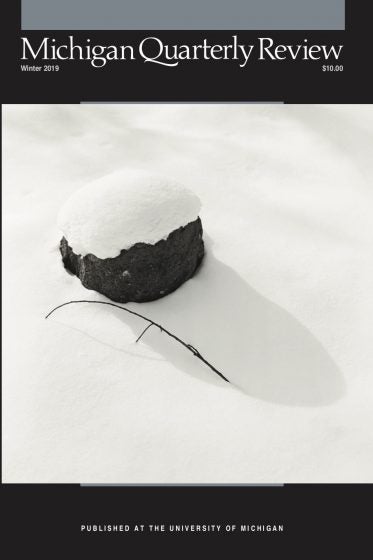“Searching for Elijah,” by Jai Chakrabarti, appears in the Winter 2019 Issue of MQR.
Malini and her son were the last to arrive at the beach house in Malibu. Mrs. Cohen greeted them at the door, engulfing Malini in her silk décolleté caftan, and hurried them to the table.
“Now that we’re all here,” Mrs. Cohen said.“Shall we wash?”
The family mumbled a collective yes. Around the table there were four cousins, three neighbors, Stephen, his older sister, and Mr. Cohen. Everyone smiled back at Malini, conveying what she assumed were varying degrees of suspicion and curiosity. Amar, who was waking from a cross-country sleep, buried his face in her lap.
“We wash before the meal,” Stephen whispered.
“I know.” Malini had researched the Passover Seder via an audio guide that described the order and meaning of the ceremony. Riding the subway home from work, she’d donned headphones to mouth the Hebrew words as they were said. Kiddish. Magid. Maror. But now that she was here, it did not seem so simple, not with all the family watching and her son wondering what came next.
“We do it a little differently,” Stephen said. “We wash each other’s hands.”
Her little boy tried to hide behind her legs, and she had to coax him to the kitchen, where Mr. Cohen lifted him onto the countertop and washed his hands first. Amar smarted at the feel of the cold water, but Stephen’s dad was ready with a magic trick that ended with two red jellybeans. Amar laughed and splashed water.
“You—be calm,” Malini said. Before they’d left New York, she had Amar promise that he would be on his best behavior.“If you are,” she’d said, “there’ll be a new toy for you. That Go-Go-Gadget all your kindergarten friends want.”
“Your turn,” Mrs. Cohen said.
Malini presented her hands—a queen’s hands, the color of molasses— fingers slender and long. Both hands were adorned: a sapphire ring crowned each one.
“They’re beautiful,” Mrs. Cohen said.
She’d bought the rings three years earlier when her husband had passed away. The astrologer had told her they were for love and persistence.
Mrs. Cohen poured water on Malini’s palms, three times on the left, three times on the right. She wrapped Malini’s hands in a towel and dried them. It felt like an unearned intimacy, but Malini maintained her smile.
Mrs. Cohen leaned close to whisper,“I bless you for tomorrow’s mikveh. That you may be purified, that you may be holy.”
Malini recoiled from Mrs. Cohen’s grasp. Tomorrow’s mikveh, the purification ritual, had been on her mind ever since she and Stephen had become serious. She cut her eyes at Amar, who was splashing water again, but this time it was a welcome distraction from Mrs. Cohen’s gaze.
“Thank you for the blessing,” Malini said. Then she went to tend to her son.
Malini and Stephen had met at the farmer’s market. In between nanny shifts, Malini worked a food stall called Brooklyn Masala Co., where she sold her simmering sauces and chutneys. She was there every weekend, and the other stall owners knew her so there was never a lack of eyes on Amar. Her boy could wander through the market and be safe while she sold her cooking and chatted with her customers.
It was the tikka masala sauce, the simmer of coconut and cardamom-infused tomato, that Stephen came back for, again and again, but it was only on his sixth time, he later told her, that he had had the courage to speak.
“Your sauce,” he had said.“It’s out of this world.”
She’d smiled as she did at all such compliments. She prided herself on knowing straightaway when a man had fallen for her, and knowing as well the basic blueprint of him, his decency, for example, or his sense of duty towards family. What she guessed of Stephen was that he was simple in his emotions, in his experience of love and loss, but that he was honest about his ignorance. Stephen would be willing to alter his life to fit one more, maybe even two, and if she had told him then, Go fetch me the moon, he would’ve borrowed a ladder and tried his best.
They began to see each other. A dim café, the ferry to Governor’s Island, a stroll in the village, always Amar in tow, though that dampened the romance. Her boy was obedient but didn’t always know his words and couldn’t express himself properly when he saw her kissing another man; she tried to console him, his bruised heart close to her breast.
Stephen was tender with her, and with her boy he learned how to play games they both grew to love. Often, he praised her beauty; he kissed her ankle bone over a hundred times once, stopping only when she told him it tickled. She enjoyed the smell of his shirts, with the collars crisp but not overly starched. His promenade apartment was spacious. She chose to ignore the way he catalogued his boxers into separate drawers, one for the whites, another for the blues, focusing instead on the hand-carved Buddha in the living room, who sat atop a mountain of water, whose Himalayan shape was sustained by a complex motor that produced a purring, nearly mammalian whirr. The first time they made love in that room it felt to her as if they were floating in the middle of a pool, and she thought then not of her dead husband but of her childhood, when she’d skipped rocks into the endless Ganges, when all the boys had remarked on her looks, though she was not so young now, nor as beautiful, perhaps, but believed the Ganges in its morning light would see her that way—young and unmarred—until the man next to her began to snore and she knew the river was as far away as it really was….
Purchase MQR 57:5 or consider a one-year subscription to read more. This story appears in the Winter 2019 Issue of MQR.








